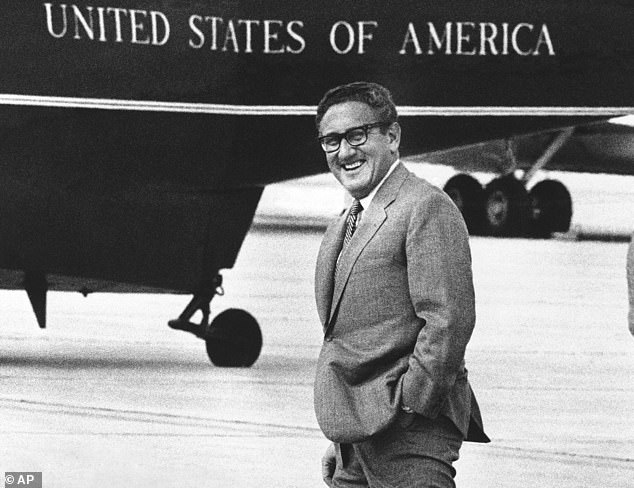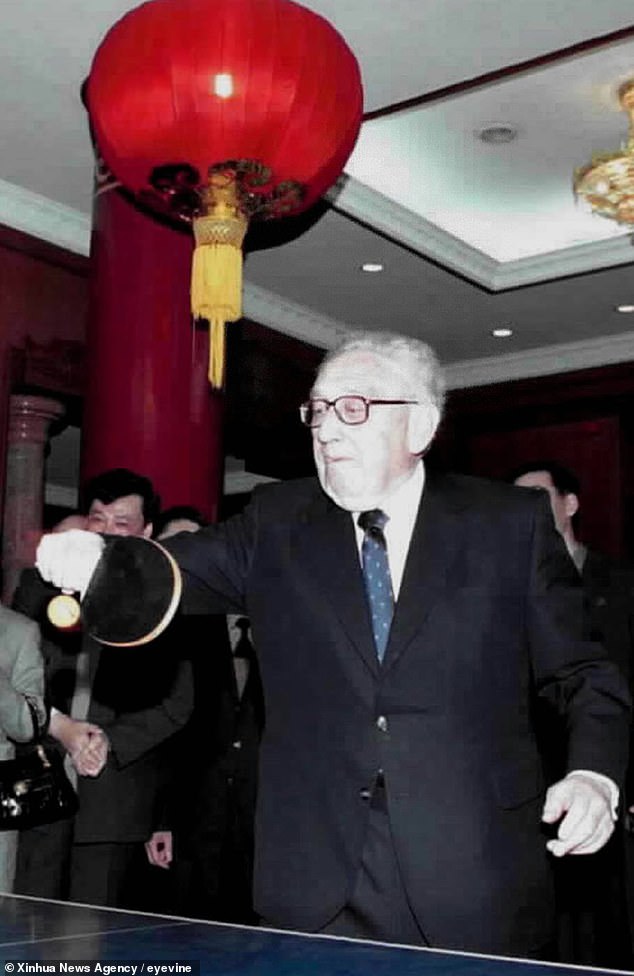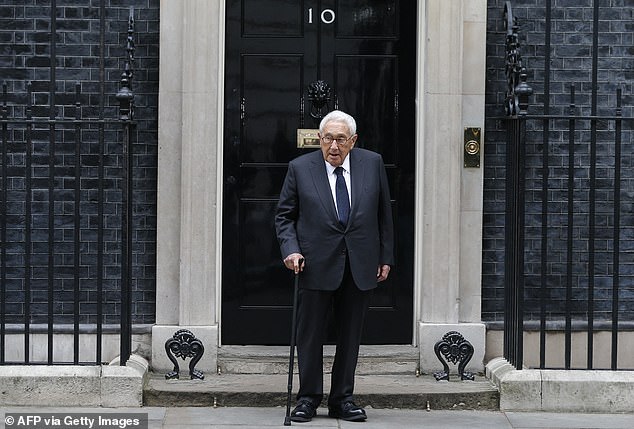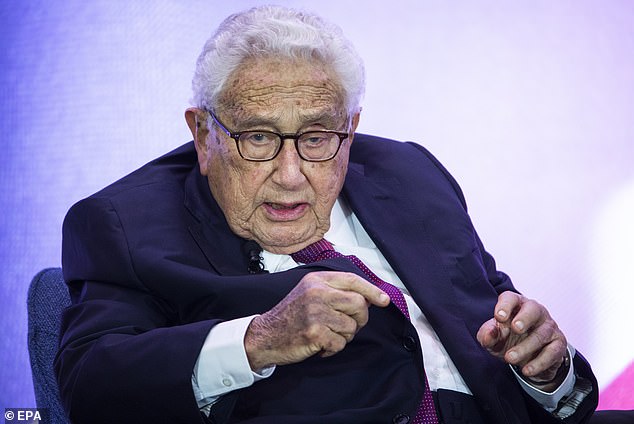The secret to a long life is supposedly a combination of healthy diet, minimal stress and plenty of exercise. Or so we’re often told.
But what about the exceptions?
One of the most well-known has to be former Secretary of State Henry Kissinger, who died on Wednesday aged 100.
His longevity had long been mysterious: the influential politician was well-known for his love of fatty foods like schnitzel and sausages, and aversion to exercise.
David Kissinger, the late secretary’s oldest child and only son, described his father’s survival as ‘miraculous’ earlier this year.
And speaking in his last TV interview in October, Kissinger senior seemed as surprised as anyone to have made it to the centenarian club, saying: ‘How I lived to be 100? I don’t know. I didn’t aim for it.’

Former US Secretary of State Henry Kissinger at Andrews Air Force Base near Washington, in 1972

David Kissinger wrote that his father was more often a spectator of sports rather than a participant

Kissinger arriving at 10 Downing Street in London in 2016

Kissinger delivering remarks at the US State Department’s 230th Anniversary Celebration in Washington, DC in 2019
Theoretically, Kissinger’s lifestyle geared him up for an early grave.
Not only due to diet and zero exercise, but also because of his ‘career of relentlessly stressful decision-making,’ as his son put it.
So what’s his secret?
According to Kissinger’s son, the secret to his father’s long lifespan was his brainpower – and the relentless intellectual stimulation.
He had an ‘unquenchable curiosity that kept him dynamically engaged with the world,’ David wrote for The Washington Post in May.
David, a father-of-four and television executive producer, wrote the Covid-19 pandemic didn’t even slow down the former secretary, who completed two books during lockdowns.
In later life, Kissinger continued to travel and participate in speaking engagements around the globe.
Despite being long removed from his political post, Kissinger stay engaged in current events, keeping his mind sharp and engaging in debates on technology and artificial intelligence.
David, 62, wrote: ‘His mind is a heat-seeking weapon that identifies and grapples with the existential challenges of the day.’
Also responsible for his longevity, David wrote, was his father’s sense of purpose.
‘The other secret to my father’s endurance is his sense of mission. Although he has been caricatured as a cold realist, he is anything but dispassionate.’
David continued: ‘He believes deeply in such arcane concepts as patriotism, loyalty and bipartisanship. It pains him to see the nastiness in today’s public discourse and the seeming collapse of the art of diplomacy.’
Kissinger junior isn’t the only person who tout the physical benefits of keeping a sharp mind.
Former Google CEO Eric Schmidt, who co-wrote a book on AI with Kissinger in 2022, said the former secretary never stopped working, which he said kept him alive.
Schmidt told The Tom Ferriss Podcast: ‘He works harder than a 40 year old. I can tell you that he gets up in the morning and he works all day. He has dinner with his wife and his family and he works at night.
‘I am convinced that the secret to longevity is being a workaholic.’
According to Thomas Perls, director of Boston University’s New England Centenarian Study, reaching the age of 90 is 30 percent genetics and 70 percent lifestyle.
Roughly 70 percent can be explained by genetics if you live to 110, he adds.
Dr Jay Olshansky, a research associate at the Center on Aging at the University of Chicago, told DailyMail.com genetics plays the largest role in aging and longevity.
He said: ‘No one can live that long unless they won the genetic lottery at birth… Not all risk factors operate the same way for everyone.
‘Overall, people who don’t smoke and have healthier diets tend to live longer and healthier lives.
‘If only we could know in advance, at a younger age, whether we fall into the category of someone who can live long with challenging risk factors – many would alter their lifestyles accordingly.’
Kissinger’s mother and father, Paula and Louis Kissinger, died at 97 in 1998, and at 95 in 1982, respectively.
The former secretary was born Heinz Alfred Kissinger in the small town of Fürth, a city in northern Bavaria, Germany, in 1923.
Life expectancy for people born in Germany around that time ranged from 42 to 56 years old.
Kissinger, who was Jewish, fled Nazi Germany and moved to the US with his family in 1938 at the age of 15. At that time in the US, life expectancy for men was 62 years.
Thirty years later, former President Richard Nixon appointed Kissinger as National Security Advisor in January 1969. He then became secretary of state in September 1973, a position he held until January 1977.
With his second appointment, he became the first person ever to serve as both secretary of state and national security adviser.
Two decades ago, Kissinger joined the ‘SuperAgers,’ the group of people 80 years and older who remain mentally sharp and generally healthy. These SuperAgers don’t necessarily follow a lifestyle doctors recommend, like a healthy diet and exercise, but they retain their cognitive abilities.

A docuseries on Netflix titled Live to 100: Secrets of the Blue Zones, delved into five places with ‘blue zone’ status: Okinawa, Japan ; Sardinia, Italy ; Nicoya, Costa Rica; Ikaria, Greece ; and Loma Linda, California
Longevity experts suggest other factors are at play, including strong social connections, daily routines and habits.
Older people who were visited by family and friends once a month were found to live longer than those who had fewer visits, a recent study found.
Research on people living in ‘Blue Zones’ – areas of the world with lower rates of chronic disease and generally healthier residents who live into their 90s and often surpass 100 years old – show nine lifestyle habits said to be most important for a long life.
These include: building exercise and activity into everyday life, a sense of purpose, finding ways to decrease stress, stopping eating before you’re uncomfortably full; eating a plant-based diet; moderate and regular alcohol intake; faith; focusing on family and relationships; and a strong social circle.
While Kissinger was not born in or a resident of a Blue Zone, he followed a few of these habits – most notably the sense of purpose.
Dr Olshansky told DailyMail.com these factors are ‘interestingly and marginally relevant,’ but ‘choosing’ long-lived parents is someone’s strongest chance at living well into his old age.
He added: ‘I’d begin by choosing long-lived parents. Then avoid behavioral risk factors that shorten life. Then adopt healthy lifestyles. Even then, there will still be great variation in longevity.’












